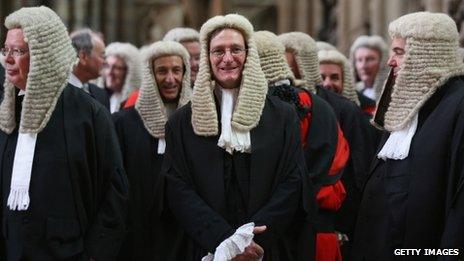Q&A: Why is the first Assembly Bill facing a challenge?
- Published

Attorney General Dominic Grieve, pictured centre, is challenging the Bill
The first Bill passed by the assembly under its new law-making powers will be challenged in the Supreme Court. The UK attorney general is asking the court to rule that parts of the Local Government (Byelaws) (Wales) Bill are beyond the assembly's powers and therefore unlawful. The Welsh government says it is all within its powers and it will vigorously defend the claims.
Toby Mason explains more.
Q: What is this bill all about?
A: It is a relatively simple piece of legislation - it streamlines the way councils make byelaws, removing the need for Welsh ministers to give their consent.
The aim is to reduce bureaucracy and the length of time it currently takes to make byelaws. It was criticised for being an unambitious piece of legislation to be the first one through the assembly after the March 2011 referendum on full law-making powers. It went through the legislative process without a hitch and was passed unanimously by AMs in early July 2012.
Q: But it has run into potentially serious constitutional trouble?
A: Yes. It transpires the UK government had been privately warning the Welsh government for months that it believed parts of the Bill were beyond the assembly's powers.
Why? Because as well as removing the need for Welsh ministers to confirm byelaws made by councils in Wales, it also removed some residual pre-devolution powers for UK secretaries of state to confirm them, too.
Although the assembly now has power to make laws in all the devolved fields, including local government, without Westminster's permission, one thing it can't do is legislate to change the functions of Westminster ministers without their consent. This is what the UK government claims has happened here.
Q: So what has happened?
A: The attorney general Dominic Grieve has used a kind of "backstop" power he has within the Government of Wales Act which enables him to intervene after a Bill has been voted through by the assembly but before it goes to the Queen for Royal Assent.
It means that if he believes that all or part of a bill exceeds the assembly's powers, he can refer it to the Supreme Court for its determination. He will open proceedings on Tuesday to lay out his case as to why five senior judges, including the President of the Court, Lord Neuberger, should find the bill unlawful.
Q: But the Welsh government and the Assembly Commission are clear that the bill is lawful?
A: Yes. They are preparing to mount a strong defence in the Supreme Court. Both will argue that the changes that the bill makes to UK ministers' powers are merely "incidental to" or "coincidental upon" the changes the bill makes to the powers of Welsh ministers.
If they can argue that successfully, then they will be optimistic that the court will find in their favour, since the Government of Wales Act explicitly allows for the assembly to change UK ministers' powers in those circumstances. It is fair to say that some constitutional observers are sceptical the court will accept this argument - although this is such an unusual case that it is impossible to know how it will turn out.
Q: When will we get a result and what happens then?
A: There will be three days of legal arguments in front of those five senior judges, where the UK and Welsh governments, and the Assembly Commission will all make their cases. The Northern Irish government is also an interested party to proceedings. It will be reserved judgement, but we should hear before Christmas what the court has found.
If they side with the Welsh government and the assembly, the bill will proceed to Royal Assent and become law. If the UK government wins its case, then the assembly will need to begin a process of reconsidering the bill and vote again to amend the parts that the court has found to be unlawful - something that will be extremely embarrassing for all concerned.
Q: Could this process happen again in the future?
A: This is a pretty narrow point of law so it shouldn't have any major implications for the future. But the Welsh government is preparing to publish a much more controversial piece of legislation relating to a change in the organ donation system which it believes it can do under its powers in the field of health.
The attorney general has already signalled his reservations about whether this is the case, so we could find ourselves back in the Supreme Court sooner rather than later.
Today, the first bill passed by the assembly under its new law-making powers will be challenged in the Supreme Court. The UK attorney general is asking the court to rule that parts of the Local Government (Byelaws) (Wales) Bill are beyond the assembly's powers and therefore unlawful. The Welsh government says it is all within its powers and it will vigorously defend the claims.
- Published9 October 2012